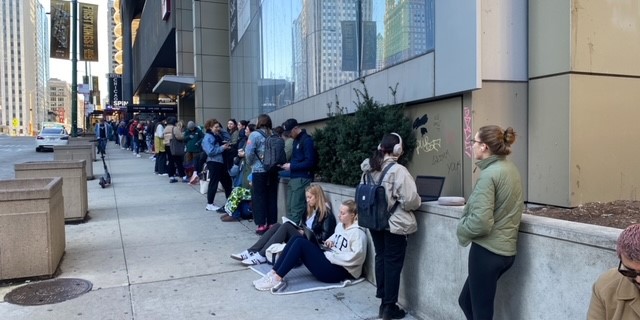Hi and welcome to the very first installment of the Social Media Book Club. It’s a new Inc. Well experiment I’ve been wanting to unveil for quite some time. Let me explain how this works and what it is. On what will hopefully be a very regular basis, I will be pairing with Lindy Sinclair, who runs operations for Rohner Letterpress here in Chicago. Lindy’s super-enthused about all things small business, and, more importantly I found her via social media.
The “social media” half of this series is that I will find a contributor and small business-minded book suggestion from Twitter and Facebook. That person will read the book, and I will grill them on it to get a sense of whether you should bother tracking down this book or who might be a good person in your life to recommend it to.
For this maiden voyage, I asked Lindy to read Chris Guillebeau’s “The $100 Startup: Reinvent the Way You Make a Living, Do What You Love, and Create a New Future.” We hopped on Gchat and discussed it. Again: She has read the book, I have not — I’m standing in for you, the average person considering possibly reading such a book. Here's a transcript of our talk.
IW: So, hi, Lindy! Thanks so much for teaming up with me and Inc. Well to help helm the Social Media Book Club. Anything special you'd like to tell readers to introduce yourself and give them an idea of who you are?
Lindy: Hi, David! Very happy to be part of this with you.
Quick intro: I've basically been interested in small business as long as I can remember. Mostly I work in areas balancing business with some sort of art or artisanship. I currently run operations for Rohner Letterpress, where I work directly with designers, stationers, and other graphic artists. I'm also an organizer of YarnCon, an annual market event focusing on independent fiber artists.
IW: Not to be confused with YarnCon, the storyslam event for knit puppets. So, anyway. You read "The $100 Startup," and I have not. Would you recommend entrepreneurs read this book? Why or why not?
Local
Lindy: This is definitely not a book for everyone. Talking about this book around the 4th of July is great timing, since Guillebeau's core theme is independence. If your idea of "startup" is a company you can sell to Google for a billion on two in a couple years, this isn't the book for you, though he touches on that, too. It's really directed at folks who just don't want to work for someone else, and helping them overcome what might be standing in their way.
IW: So it helps people find direction? Like, if they want to work for themselves but don't know what to do specifically?
Lindy: Not direction in the sense of the "what," but more the "how" and the "why."
This book won't help you figure out what you should be selling or doing. But it does ask a lot of good questions you would need to answer to be successful.
He really stresses finding the intersection between what you love, and what people will pay for.
IW: It sounds like, at least from the cover and title, it tries to empower the reader above all else. According to the book, other than $100, what do readers need to get their ideas off the ground?
Lindy: His main thesis is that you need very little, apart from some kind of product or skill. (The $100 isn't a hard number; his 50 case studies range from $0 to a couple grand, but the median was around $125.) Mainly, you need value, which means thinking about what you have to offer in terms of how it benefits others. Another key is what he calls "hustle," defined as equal parts talk and work.
Other parts of the book are concerned with what you DON'T need: a complicated business plan, a chunk of venture capital, a custom-built e-commerce platform with all the bells and whistles.
IW: Did you learn much from it? Do you think someone who hasn't been self-employed before would?
Lindy: I did get a good bit out of it. I think it's a strong recommendation for someone who's thought, however fleetingly, of doing their own thing, but hasn't pursued it due to fear, or inertia, or the objections of others. The author really tries to lower the barriers of entry. It doesn't have to be all or nothing; you don't have to quit your job and starve your kids to be your own boss. He lays out a pretty good case for just taking the leap, even if that leap is a couple of baby steps. And he uses a really wide range of case studies to demonstrate that there's no "right" way to do it.
Plus, it's a really easy read; apart from overuse of the "solopreneurship" tag, it mostly avoids jargon and sticks to common-sense language. I got through it in a couple of days.
IW: It sounds like it's a little one-size-fits-all to me. Are there any shortcomings in that regard? Any noticeable blind spots or things you felt were glossed over?
Lindy: Actually, I'd disagree with that. Profiles range from brick & mortar shop owners to folks who travel the world with no fixed address. There are a few thing I wish he'd covered in more depth, which I'll get to in a minute, but I'm curious why you get that impression?
IW: Just from the name and some of what you've said so far -- that it's meant to empower readers to get off their butts and start a business. A sort of "you can do it!" but not really specifying on the "who" or the experience they might have. That's all.
Lindy: It definitely has a bit of a cheerleading bent, which I did find a little annoying after awhile, but rather than tagging it as "one-size-fits-all," I think he is directing the book at a specific audience: those folks who want to start something but for whatever reason find it too daunting.
IW: That's a pretty big, undefined audience! I'd just be inclined to think it might be a little too vague in some spots to be helpful to everyone. The old maxim about when you try to please everyone you please no one.
Lindy: That is true. And because of that, there's a lot he has to leave out. There's nothing in the book about business licenses, dealing with government, how to harness technology when your idea of "social media" is handing your newspaper to your neighbor. This is for sure not a nuts-and-bolts manual; if that's what you're looking for, you'll be disappointed.
IW: What are other things you wish he'd covered a little bit more?
Lindy: I would have preferred a little more insight into the nuts and bolts of his own ventures. I realize that taxes and licenses and the administrative stuff is totally unsexy and locale-specific, but I think including tidbits from his own work would paint a more well-rounded picture.
IW: Cool. Any other final thoughts?
Lindy: If you haven't done a lot of reading in this field, or just randomly wonder if your idea is worth building a business around, I'd say it's a good, accessible entry.
Want to suggest a contributor or a book? Hit me up at @davidwolinsky!

David Wolinsky is a freelance writer and a lifelong Chicagoan. In addition to currently serving as IFC’s comedy, film, and TV blogger, he's also a comedy-writing instructor for Second City and an adjunct professor in DePaul’s College of Computing and Digital Media. (He also co-runs a blog behind the DePaul class, DIY Game Dev.) He was the Chicago city editor for The Onion A.V. Club where he provided in-depth daily coverage of this city's bustling arts/entertainment scene for half a decade. His first career aspirations were to be a game-show host.
Lindy Sinclair has pursued her lifelong interest in small business into her current gigs running operations at Rohner Letterpress and co-organizing YarnCon. She's worked with hundreds of independent artists, artisans, and other business owners over the last two decades.



